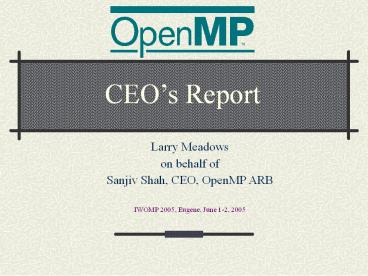CEO PowerPoint PPT Presentation
Title: CEO
1
CEOs Report
- Larry Meadows
- on behalf of
- Sanjiv Shah, CEO, OpenMP ARB
- IWOMP 2005, Eugene, June 1-2, 2005
2
Agenda
- The OpenMP ARB
- Activities over the last year
- Activities for the next year
- Beyond 3.0
3
The OpenMP ARB
- The care of OpenMP is in the hands of the OpenMP
Architecture Review Board (the ARB). - The ARB
- Interprets OpenMP
- Writes new specifications - keeps OpenMP
relevant. - Works to increase the impact of OpenMP.
- Organizations join the ARB - not individuals
- Current members
- Permanent Fujitsu, HP, IBM, Intel, NEC, SGI,
Sun, PGI - Auxiliary ASCI, cOMPunity, EPCC, KSL, NASA
- New member since last report NASA
4
OpenMP ARB Current Organization
5
Agenda
- OpenMP history and the ARB
- Activities over the last year
- Activities for the next year
- Beyond 3.0
6
Activities over last year
- Workshops continue
- WOMPAT 2004 (Barbara Chapman) another good Lab
session - WOMPEI 2004, (can anyone report?)
- IWOMP 2005 inaugurates the merged conference
- Website finally under ARB control
- Debug committee published a whitepaper
- And most importantly...
7
OpenMP 2.5 is released!
Congratulations and thanks to Mark Bull and all
of the omp-lang team for releasing a
specification for the ages.
What the critics say
I must congratulate the committee on a work well
done. It's been quite a challenge to unify the
spec for Fortran AND c/c, but in my opinion you
have succeeded well. (Nils Smeds, KTH)
let me first congratulate you to this very fine
piece of work (Michael Suess, University of
Kassel)
I laughed, I cried, I couldnt put it down. Two
thumbs up! (Anonymous parallel programmer)
8
Agenda
- ARB
- Activities over the last year
- Activities for the next year
- Beyond 3.0
9
OpenMP 3.0
- Mark Bull will chair the committee
- Schedule to be fixed in advance (timeline and
milestones) - Feature list
- Must have features
- Desirable features
- Drop those from desirable list that cant be done
in time - Target release September 2006
- Work backwards to create schedule
10
3.0 High Priority Features
- WorkQueuing
- Standardized variables for
- stack size control
- idle-thread behavior
- Additional SCHEDULE kinds
- Reductions with user defined functions
- REDUCE construct
11
3.0 High Priority Fixes
- Remove storage reuse for private
- THREADPRIVATE persistence and nesting
- C/C directive grammar
12
Agenda
- ARB
- Activities over the last year
- Activities for the next year
- Beyond 3.0
13
OpenMP Libraries
- All successful languages encourage libraries
more modern languages are mostly about libraries
(MFC, STL, Java class libraries, LAPAK, BLAS,
...) - Parallel languages need libraries even more
- Parallel programming is hard
- Parallel algorithms can be developed by experts
and used by novices - Modern languages (C, C) allow expressing
parallelism via metaprogramming (like STL)
14
OpenMP Problems for Libraries
- There is no ABI for OpenMP
- Even on the same hardware e.g., PGI, Intel,
Microsoft, and Pathscale all have x86-64
compilers can you mix and match OpenMP code
compiled with different compilers? - Theres a gcc project to do OpenMP. Do we really
want another gcc compatibility race? - There is no analogy to MPI communicators
- Threads have a global scope need a library
scope - Nested parallelism/Orphaning enough?
15
Suggestions for action
- Subcommittee to work on libraries
- Canned algorithms Graph/numerical/search/media
algorithms (mp3, mpeg, imaging, LAPACK, BLAS2/3,
FFT, ) - Metaprogramming C container classes
implementing parallel versions of classic
algorithms (hashes, sorting, lists, stacks, ) - ABI discussions
- This needs to be driven by the vendors
- Will we ever agree? Very hard, but our users
suffer - If we dont do something, well be forced to
accept whatever gcc comes up with
16
OpenMP Features
- We want 3.0 to be done quickly
- Nothing substantial has changed since 2.0 (really
1.1) - There is a real need for flexible parallel
languages, given the HW architecture progression - We need a plan for 3.0
- Research is fertile ground for new ideas
- DARPA HPCS
- See Suns Fortress, Crays Chapel, IBMs X10
- Atomic blocks (transactional memory semantics)
- Futures/continuations
- ...

